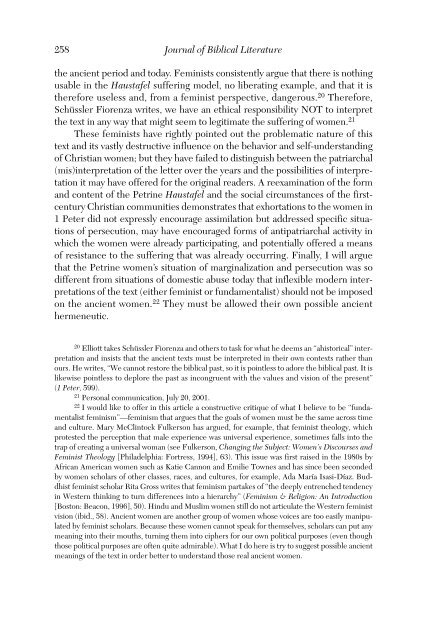Journal of Biblical Literature - Society of Biblical Literature
Journal of Biblical Literature - Society of Biblical Literature
Journal of Biblical Literature - Society of Biblical Literature
You also want an ePaper? Increase the reach of your titles
YUMPU automatically turns print PDFs into web optimized ePapers that Google loves.
258<br />
<strong>Journal</strong> <strong>of</strong> <strong>Biblical</strong> <strong>Literature</strong><br />
the ancient period and today. Feminists consistently argue that there is nothing<br />
usable in the Haustafel suffering model, no liberating example, and that it is<br />
therefore useless and, from a feminist perspective, dangerous. 20 Therefore,<br />
Schüssler Fiorenza writes, we have an ethical responsibility NOT to interpret<br />
the text in any way that might seem to legitimate the suffering <strong>of</strong> women. 21<br />
These feminists have rightly pointed out the problematic nature <strong>of</strong> this<br />
text and its vastly destructive influence on the behavior and self-understanding<br />
<strong>of</strong> Christian women; but they have failed to distinguish between the patriarchal<br />
(mis)interpretation <strong>of</strong> the letter over the years and the possibilities <strong>of</strong> interpretation<br />
it may have <strong>of</strong>fered for the original readers. A reexamination <strong>of</strong> the form<br />
and content <strong>of</strong> the Petrine Haustafel and the social circumstances <strong>of</strong> the firstcentury<br />
Christian communities demonstrates that exhortations to the women in<br />
1 Peter did not expressly encourage assimilation but addressed specific situations<br />
<strong>of</strong> persecution, may have encouraged forms <strong>of</strong> antipatriarchal activity in<br />
which the women were already participating, and potentially <strong>of</strong>fered a means<br />
<strong>of</strong> resistance to the suffering that was already occurring. Finally, I will argue<br />
that the Petrine women’s situation <strong>of</strong> marginalization and persecution was so<br />
different from situations <strong>of</strong> domestic abuse today that inflexible modern interpretations<br />
<strong>of</strong> the text (either feminist or fundamentalist) should not be imposed<br />
on the ancient women. 22 They must be allowed their own possible ancient<br />
hermeneutic.<br />
20 Elliott takes Schüssler Fiorenza and others to task for what he deems an “ahistorical” interpretation<br />
and insists that the ancient texts must be interpreted in their own contexts rather than<br />
ours. He writes, “We cannot restore the biblical past, so it is pointless to adore the biblical past. It is<br />
likewise pointless to deplore the past as incongruent with the values and vision <strong>of</strong> the present”<br />
(1 Peter, 599).<br />
21 Personal communication, July 20, 2001.<br />
22 I would like to <strong>of</strong>fer in this article a constructive critique <strong>of</strong> what I believe to be “fundamentalist<br />
feminism”—feminism that argues that the goals <strong>of</strong> women must be the same across time<br />
and culture. Mary McClintock Fulkerson has argued, for example, that feminist theology, which<br />
protested the perception that male experience was universal experience, sometimes falls into the<br />
trap <strong>of</strong> creating a universal woman (see Fulkerson, Changing the Subject: Women’s Discourses and<br />
Feminist Theology [Philadelphia: Fortress, 1994], 63). This issue was first raised in the 1980s by<br />
African American women such as Katie Cannon and Emilie Townes and has since been seconded<br />
by women scholars <strong>of</strong> other classes, races, and cultures, for example, Ada María Isasi-Díaz. Buddhist<br />
feminist scholar Rita Gross writes that feminism partakes <strong>of</strong> “the deeply entrenched tendency<br />
in Western thinking to turn differences into a hierarchy” (Feminism & Religion: An Introduction<br />
[Boston: Beacon, 1996], 50). Hindu and Muslim women still do not articulate the Western feminist<br />
vision (ibid., 58). Ancient women are another group <strong>of</strong> women whose voices are too easily manipulated<br />
by feminist scholars. Because these women cannot speak for themselves, scholars can put any<br />
meaning into their mouths, turning them into ciphers for our own political purposes (even though<br />
those political purposes are <strong>of</strong>ten quite admirable). What I do here is try to suggest possible ancient<br />
meanings <strong>of</strong> the text in order better to understand those real ancient women.

















